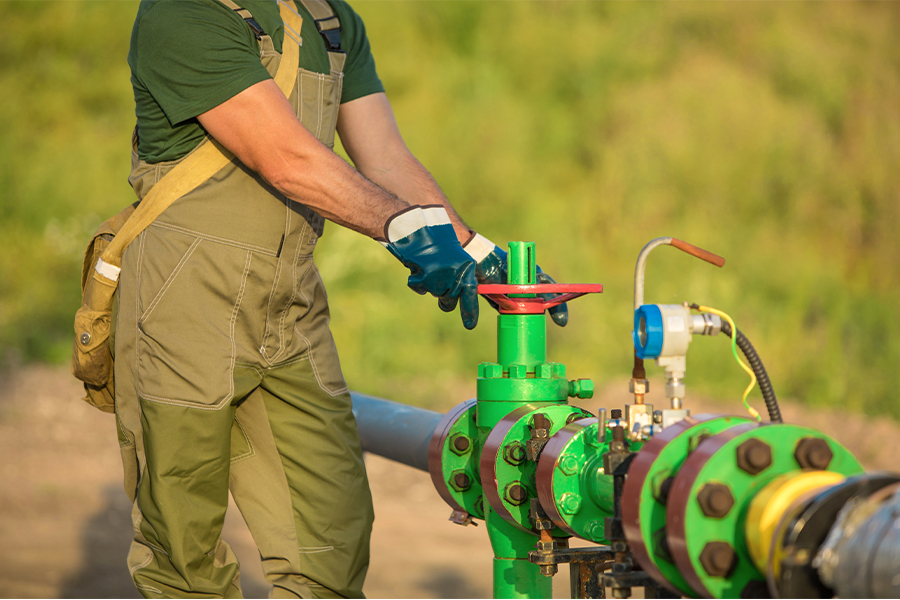Table of Content
How is the working environment and intensity of work in oil and gas companies?
The working environment of oil and gas companies includes sites such as oil fields, drilling wells, production units, and oil storage facilities.
In oil fields and drilling sites, workers are required to perform tasks such as geological exploration, wellhead operations, drilling, and cementing. On the other hand, in production units and oil storage sites, workers mainly engage in oil and gas extraction, processing, and storage.
While these environments offer great economic potential, they also present numerous hazards and challenges.
In oil and gas company work environments, workers can be exposed to high temperatures, high pressures, chemical exposure, fires, and explosions, among other risks.
For example, drilling workers are exposed to high wellbore temperatures, high wellhead pressures, and the release of large amounts of toxic gases.
Engineers and technicians are exposed to chemical exposure and the potential risk of explosions.
Operators and maintenance personnel may be exposed to injuries from hot equipment and moving machinery.
The work intensity in oil and gas companies is also significant.
Many operations require continuous 24/7 shifts, including night shifts.
Certain positions require physical labor, such as lifting heavy loads and maintaining equipment, which requires a high level of physical strength and endurance.
Workers may also be exposed to emergencies that require them to respond quickly, such as equipment failures or leaks. Additionally, the industry often imposes strict production goals and schedules, leading to high levels of work-related stress. Workers are required to undergo various training programs to ensure they are aware of safety procedures, operational protocols, and emergency response strategies.
What is the importance of safety gloves for workers in oil and gas companies?
Safety gloves play a crucial role in protecting workers in oil and gas companies.
Cut resistant gloves or Impact resistant gloves can provide physical protection and minimize the risk of hand injuries. When workers are involved in drilling, cutting, or lifting heavy objects, safety gloves effectively slow down or block mechanical irritants, preventing cuts, abrasions, crushes, and impacts.
Chemical resistant gloves are also essential for chemical hazard protection. In oil and gas company work environments, workers may come into contact with hazardous chemicals such as oil, solvents, and corrosive liquids. Safety gloves act as a barrier, blocking hazardous substances from direct skin contact. This reduces the risk of skin absorption of harmful chemicals and minimizes corrosion and chemical-induced irritation.
Another crucial aspect is the prevention of electrical risks. Insulated gloves are particularly important for workers in electrical or high-voltage environments. These gloves prevent electric current from passing through the hands, thereby reducing the risk of electric shock.
Heat resistant gloves help workers cope with hot environments. Heat-resistant gloves protect hands from burns caused by hot objects, steam, or sources of ignition.
Lastly, wearing safety gloves enhances dexterity and overall safety. Well-designed gloves provide a comfortable fit and do not impede hand movement, enabling workers to operate equipment and tools efficiently and safely. They also offer additional slip resistance, further improving workplace safety.
What kind of safety gloves do oil and gas company workers need to wear on the job to be adequately protected?
To ensure the safety of oil and gas workers, appropriate safety gloves that meet their specific work environment and risk requirements should be worn. Key factors in choosing safety gloves are the characteristics of the work environment and the potential risks involved.
Cutting protective gloves: These gloves are suitable for work environments that involve handling sharp tools, objects, or steel bars. Made of cut-resistant materials, they provide a high level of puncture resistance, reducing the risk of cuts or puncture wounds.
High-temperature protective gloves: These gloves are used in work environments with high temperatures, hot surfaces, or flames. Usually made of high-temperature resistant materials like blaze-resistant coatings or heat-resistant fibers, they effectively protect hands from burns or scalds.
Chemical protective gloves: Work environments that involve contact with chemicals require chemical protective gloves. It is important to select gloves that are resistant to specific chemicals encountered, such as acids, alkalis, solvents, etc., meeting the appropriate standards and certification requirements.
Insulated gloves: For work environments with a risk of electric shock, insulated gloves prevent electric current from passing through the hands, protecting workers from electric shock injuries. These gloves should comply with relevant electrical safety standards to ensure their insulating properties and protective effects.
Other factors to consider when selecting safety gloves include their proper size, dexterity, quality of materials, and specific requirements of the work environment. Workers should choose appropriate safety gloves for their specific tasks and risk requirements, while following correct wearing and usage methods to ensure effective protection without hindering work operations.
In oil and gas companies, where can shockproof hand gloves be used?
Shockproof hand gloves can be used in various workplaces within oil and gas companies to protect workers from the effects of vibrations and reduce hand fatigue and discomfort. Some examples include:
- Drilling operations: Drilling operations often involve large drilling equipment that generates vibrations, which can cause hand injuries. Anti-vibration gloves can reduce the transmission of vibrations, minimizing hand fatigue and discomfort.
- Vibration equipment maintenance: Workers involved in the maintenance and repair of vibration equipment, such as compressors and generators, may come into contact with generated vibrations. In such cases, anti-vibration gloves can help reduce the impact of vibrations and protect the hands.
- Mechanical operations: Anti-vibration gloves are useful when using vibratory tools, mechanical hammers, or other mechanical equipment that may generate strong vibrations. They can mitigate the effects of vibrations and reduce exposure to vibrations.
- Loading and unloading operations: Workers involved in loading and unloading heavy loads or using vibrating equipment for device operation may benefit from anti-vibration gloves. The gloves help minimize the effects of vibrations during these tasks.
- Vehicle operation: When driving or operating vehicles or mechanical equipment that expose workers to prolonged vibrations, anti-vibration gloves can reduce the adverse effects on the hands.
- Anti-vibration gloves are designed to reduce the amount of vibration energy transferred from vibrating equipment to the human body. This, in turn, minimizes discomfort and possible injuries to the hands and body. By wearing anti-vibration gloves in these workplaces, workers can better cope with vibration environments, thereby improving work comfort and safety.
How can oil and gas companies source safety gloves from China?
Determine the needs: First, the company needs to define the types and specifications of safety gloves required, and choose suitable types of gloves according to different working environments and tasks, such as protective gloves, chemical protective gloves, heat-resistant gloves, and more.
Find suppliers: Find professional safety glove suppliers in the Chinese market. You can find suitable suppliers through internet searches, industry exhibitions, business directories, etc. GIVENSAFETY is definitely your best supply partner in China.
Contact suppliers: Contact potential suppliers to learn about their product range, quality, price, delivery time, etc. You can contact them by email, phone, or online chat.
Request samples: After identifying some potential suppliers, ask them to provide samples for quality and suitability testing. Sample testing can help determine if the company’s needs are met.
Business negotiations: For suppliers that meet the requirements, conduct business negotiations, including price, payment methods, delivery terms, and more. Ensure that a mutually satisfactory cooperation agreement is reached.
Ordering and payment: After determining the quantity to be purchased, sign a formal order with the supplier and make payment according to the contract.
Production and delivery: The supplier starts to produce the safety gloves and deliver them according to the agreed-upon delivery time in the contract. The company can ask the supplier to provide shipment tracking information to keep abreast of the transportation status of the goods.
Acceptance and inspection: Upon receipt of the goods, conduct acceptance and inspection to ensure that the safety gloves received are in accordance with the specifications and quality agreed upon in the contract.
Feedback and cooperation: If the quality of the safety gloves meets expectations, establish a long-term relationship with the supplier. Communicate regularly and provide feedback to continuously optimize the cooperation.
Why choose GIVENSAFETY as a supplier for oil and gas companies?
Expertise: With over 10 years of experience in exporting safety gloves, we understand the safety needs of different industries. In the oil and gas industry, we understand the safety challenges posed by high-risk and specialized environments, so our gloves are rigorously tested and validated for their protective properties.
Diversified products: Cut-resistant gloves, shock-resistant gloves, and chemical-resistant gloves are our areas of expertise. We offer a wide range of glove types and materials to meet the needs of different tasks and environments.
CE marking: Our products comply with European safety standards and are backed by reliable quality and performance guarantees.
Knowledge of import policies: Our extensive experience in the international market has given us a deep understanding of the import policies and requirements of each country. We will assist you in dealing with the relevant documents and procedures to ensure a smooth and trouble-free purchasing process.
Client reputation: We take pride in customer satisfaction and have gained the trust and praise of many clients. They extensively use our safety gloves in different industries, providing excellent protection and comfort to their employees.
Our Commitment:
Quality assurance: We strictly control the quality of our products to ensure that every pair of gloves meets high standards and provides the best safety protection for your employees.
Versatility: Whether you need cut-resistant gloves, shock-resistant gloves, insulated gloves, or chemical-resistant gloves, we have a wide range of products to meet different operational needs.
Customized solutions: We can work with you to provide customized solutions that meet your specific requirements and company image.
On-time delivery: We understand that your work schedule is tight, so we are committed to delivering the products you need on time to ensure uninterrupted work.
We look forward to building a relationship with you and providing superior security for your employees.
If you have any further questions or needs, please feel free to contact us. Thank you for your interest in us!





